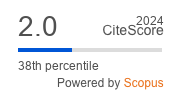Laser resurfacing of skin flaps: an experimental comparison of three different lasers
Keywords:
Laser resurfacing, Flaps, Ischemia injuryAbstract
Objective. The influence of Coherent Ultrapulse, TruPulse and Erbium:YAG laser skin resurfacing on survival of the skin flaps whenperformed simultaneously was evaluated. Material and methods. Weused twelve female Yucatan minipigs in the study. Skin flaps includingpaniculus carnosus were raised on the animals’ back. The flaps weresutured into the defect under tension. We designed 4 experimentalgroups: Control-Flaps only, Group 2-Flaps + 4 immediate TruPulselaser passes, Group 3-Flaps + 2 immediate Coherent UltraPulse laserpasses, Group 4-Flaps – immediate 50J/cm2 total fluence with Erbium:YAG laser. Results. Flap survival in Control group was 98.8%. Therewas no flap in Group 2 with complete survival. Survival of the flaps inGroup 2 (Tru-Pulse) ranged from 75-90%, with average flap survivalarea of 85.2%. In Group 3 (UltraPulse) all 24 flaps had some area of necrosis.Flap survival in Group 3 ranged from 75-95%, with an averageof 85.6%. In Group 4 (Erbium: YAG) flap survival area ranged from70-95%, with all 24 flaps with some area of necrosis, with average flapsurvival area of 87.3%. There is a significant statistical difference inflap survival area between groups 2, 3 and 4 versus Control (p<0.001).Conclusion. The results of our study suggest that laser resurfacing ofskin flaps sutured under tension in the same operative session is detrimentalfor skin flap survival. We also found no significant differencein flap survival area between TruPulse, Coherent UltraPulse and Erbium:YAG laser treated flaps.References
Dingman DL, Hartog J, Siemionow M. Simultaneous Deep plane face lift and trichloracetic acid peel. Plast Reconstr Surg.1994;93:86-93.
Mayl N, Felder DS. C02 laser resurfacing over facial flaps. Aesthet Surg J. 2004;17(5):285-92.
Guyuron B, Michelow B, Schmelzer R, Thomas T, Ellison MA. Delayed healing of rhytidectomy flap resurfaced with C02 laser. Plast Reconstr Surg. 1998;101:816-9.
Alster TS, Doshi SN, Hopping SB. Combination surgical Lifting with ablative laser skin resurfacing of facial skin: a retrospective analysis. Dermatol Surg. 2004;30(9):1191-5.
Jackson IT, Yavuzer R, Beal B. Simultaneous face lift and carbon dioxide laser resurfacing: a proven technique. Plast Reconstr Surg. 2001;108(3):802-3.
Achauer B.M., Adair S.R., VanderKam M. Combined rhytidectomy and full-face laser resurfacing. Plast Reconstr Surg. 2000;106(7):1608-11.
Babovic S, Clay RP, Battey MJ, Trevino MT, Bite U: The effect of laser resurfacing on flap survival. (Non published data).
Minoli JJ, Barton FE. A comparison of the histologic effects of chemabrasion, dermabrasion and laserabrasion in the minipig. Aesthetic Surgery J. 1998;18(1):11-8.
Stell, P. The pig as an experimental model for skin flap behavior: A reappraisal of previous studies. British J Plast Surg. 1977;30:1-8.
Adckok D, Paulsen S, Katzen T, Harper L, Nanney LB, Shack RB. Simultaneous cutaneous flap elevation and skin resurfacing in the rabbit model. Aesthetic Surg J. 1999;19(5):375-80.
Grover S, Apferberg DB, Smoller B. Effects of varying density patterns and passes on depth of penetration in facial skin utilizing thew carbon dioxide laser with automated scanner. Plast Reconstr Surg. 1999;104:2247-52.
Carniol PJ. The importance of blood supply in combination rhytidectomy and full-face carbon dioxide laser resurfacing. Arch Facial Plast Surg. 2002;4(4):227-33.
Kirn DS, Vasckonez HC, Cibull ML, Fink BF. Skin contraction with pulsed CO2 and Erbium: YAG laser. Plast Reconstr Surg. 1999;104:2255-60.
Rosenberg GJ, Brito MA, Aportella R, Kapoor S. Long-term histologic effects of the CO2 laser. Plast Reconstr Surg. 1999;104:2239-44.
McDonald WS, Beasley D, Jones C. Retinoic acid and CO2 laser resurfacing. Plast Reconstr Surg. 1999;104:2229-35.
Weinstein C, Ramirez OM, Pozner JN. Postoperative Care following C02 laser resurfacing: avoiding pitfalls. Plast Reconstr Surg. 1997;100(7):1855-66.
Bernstein LJ, Kauvar AN, Grossman MC, Geronemus RG. The short and long term side effects of carbon dioxide laser resurfacing. Dermatologic Surg. 1997;23(7):519-25.
Weinstein C. Erbium laser resurfacing: Current concepts. Plast Reconstr Surg. 1999;103:602-16.
Alister TC. Cutaneous resurfacing with CO2 and Erbium: YAG lasers: Preoperative, intraoperative and postoperative considerations. Plast Reconstr Surg. 1999;103:619-32.
Schwartz RJ, Burns AJ, Rohrich RJ, Barton FE, Byrd HS. Long-term assessment of CO2 facial laser resurfacing: Aesthetic results and complications. Plast Reconstr Surg. 1999;103(2):592-601.





